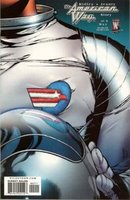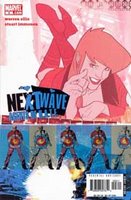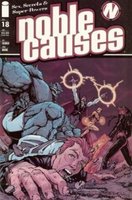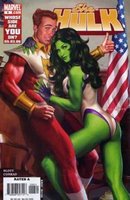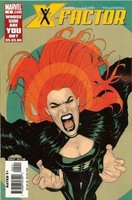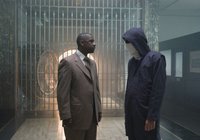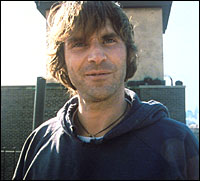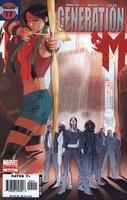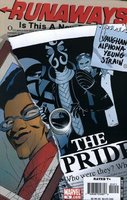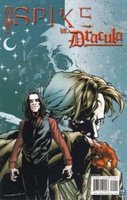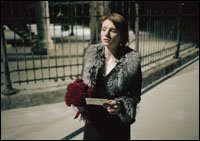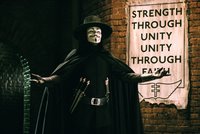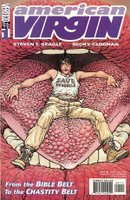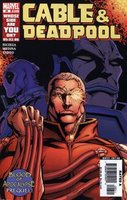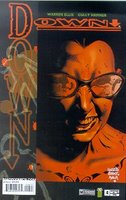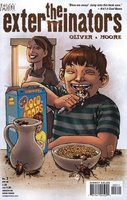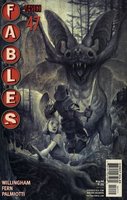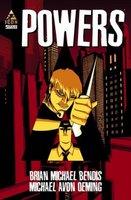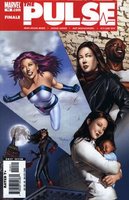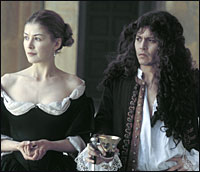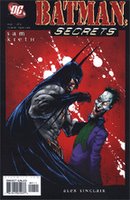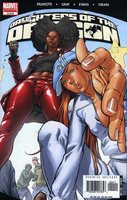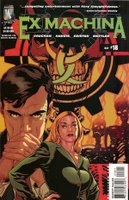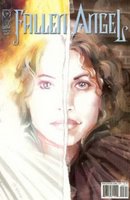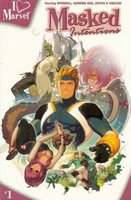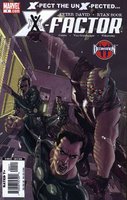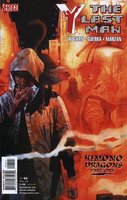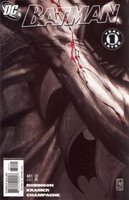
Since I'm on DC's mainstream press list thanks to reviewing a handful of comics in
Las Vegas Weekly, I usually get copies of anything they think will have appeal beyond the comics niche market: a lot of Vertigo and Wildstorm non-superhero books, big events like
Identity Crisis (they sent every issue) and
Infinite Crisis (I've gotten issues 2, 3 and 5, which doesn't make the story any easier to follow), and sometimes first issues of new DC universe series. DC obviously sees this One Year Later stunt, with all of their in-continuity DCU books skipping ahead a year, as a huge deal, since they sent me nearly every OYL issue, although only one (
Blue Beetle) is a new launch, and none are non-superhero titles. Although I really doubt any mainstream outlets are interested in a detailed analysis of this entire event, which is essentially geared toward re-energizing the hardcore fanboy faithful, I took it as a good opportunity to give the entire DCU superhero line a shot. I buy a good number of Vertigo and Wildstorm books, but haven't ever really been into DC's core superhero titles, except for a couple of Peter David books (
Supergirl and
Young Justice) and the brief run of
The Monolith.
I got 18 of the 22 (according to my count) OYL books. They are:
Action Comics #837 (Geoff Johns & Kurt Busiek/Pete Woods)
Aquaman: Sword of Atlantis #40 (Kurt Busiek/Butch Guice)
Batman #651 (James Robinson/Don Kramer)
Birds of Prey #92 (Gail Simone/Paulo Siqueira)
Blood of the Demon #13 (John Byrne & Will Pfeifer/John Byrne)
Blue Beetle #1 (Keith Giffen & John Rogers/Cully Hamner)
Catwoman #53 (Will Pfeifer/David Lopez)
Detective Comics #817 (James Robinson/Leonard Kirk)
Firestorm #23 (Stuart Moore/Jamal Igle)
Green Arrow #60 (Judd Winick/Scott McDaniel)
Green Lantern #10 (Geoff Johns/Ivan Reis)
Hawkgirl #50 (Walter Simonson/Howard Chaykin)
JSA #83 (Paul Levitz/Rags Morales)
JSA Classified #10 (Stuart Moore/Paul Gulacy)
Nightwing #118 (Bruce Jones/Joe Dodd)
Outsiders #34 (Judd Winick/Matthew Clark)
Robin #148 (Adam Beechen/Karl Kerschl)
Superman #650 (Geoff Johns & Kurt Busiek/Pete Woods)
I didn't get
Teen Titans or
Supergirl (which I'm pretty sure are not out yet) or
Supergirl & the Legion of Superheroes, or
Manhunter, which ironically is the only one of these books that I have some independent interest in and would have looked forward to reading. I've got the first
Manhunter trade that DC sent a while back, which I really ought to give a look.
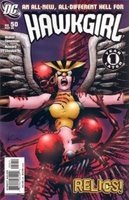
I'm not going to review these books individually, but overall they do give a picture of the current DC universe, and maybe it's that I'm sort of moving past reading a ton of superhero comics, or maybe that I've been reading Marvel books since I was 12 and only a handful of DC books in that time, but none of these got me excited about DC's characters or what they're doing with their comics. These are, almost universally, straightforward, unadventurous, very traditional superhero comics. Now, that may be exactly what DC is going for: Again, the whole point of all these various events and new jumping-on points seems to have been to reinvigorate fanboy excitement, interest among people who have been reading about many of these characters for decades. In that sense, maybe it succeeds: Batman fights Poison Ivy, Clark Kent romances Lois Lane (although he's lost his powers), Hal Jordan is Green Lantern, etc. A lot of the changes that show up in these stories seem either superficial or destined to be short-lived. Obviously, at the end of Geoff Johns and Kurt Busiek's 8-part story running through
Action and
Superman, Clark will get his powers back. Green Arrow will be mayor of Star City about as long as Lex Luthor was president of the U.S. And Selina Kyle will be back as Catwoman as soon as she loses her baby weight.

All of which is fine, to a point. Everyone knows that mainstream superhero comics (and this goes for Marvel, too) thrive on the illusion of change rather than actual change. But the problem is that for an event pitched on the idea that nothing will ever be the same, everything seems remarkably...the same. My biggest issue is that reading through these 18 comics gives me absolutely no idea of what earth-shattering events occurred in this allegedly incredibly important
Infinite Crisis mini-series (granted, reading the random issues they've sent me hasn't illuminated that much, either). Not to mention the mini-series that led up to it, or the massive 52-issue weekly series we've got coming in May. A few mentions here and there, but otherwise nothing. I realize that these issues are supposed to provide clean starts for new readers, and as a new reader I appreciate that, but it makes the huge crossover events appear hugely inconsequential.
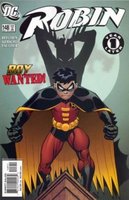
So the event itself is flawed at best. But what about the stories? I admit, a couple of them (
Robin and
JSA Classified) piqued my interest enough that I'd even consider buying the next issues, especially for
Classified since the nature of the series means that it will be a self-contained story by that particular creative team and then I can stop reading after that. I am always wary of jumping on long-running company-owned superhero books (DC or Marvel) because I know that they will only get bogged down in crossovers and editorially-mandated changes and then end up changing creative teams. Since I dropped the main X-Men books, every single title I read monthly is one that I started reading with its first issue and is still written by its original writer (and in many cases drawn by its original artist). I like books on which the creative team seems to have a genuine investment, and I'm not one of those people who has an emotional attachment to certain characters such that I will follow them through any creative team no matter how crappy (at least not since I broke my X-Men habit).
Aside from a few intriguing mysteries - and Adam Beechen's murder mystery in
Robin is the best, since it hinges on something that happens in the actual issue and not in the nebulous missing year - there isn't much to entice the reader back for another issue. Very few of the stories were incomprehensible to me as a new reader, although
JSA and
Blood of the Demon were pretty much impossible to follow as someone unfamiliar with the characters, and
Birds of Prey and
Firestorm clearly had a lot that went over my head. Some of them read like any random issue you could imagine, with little to do with a year missing since the previous issue. Some, especially the usually talented James Robinson's incredibly tired Batman stories, read like something that any superhero comics reader has already encountered a thousand times over. With the exception of Bruce Jones's atrocious
Nightwing, nothing was particularly poorly written. But none of the writing excited me, either, gave me that sense of adventure and suspense that you want out of a good superhero comic.
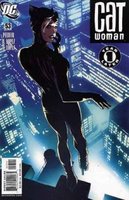
The art was almost universally bland as well, which sort of surprised me since several of the artists (David Lopez, Leonard Kirk, Karl Kerschl) are people whose work I've enjoyed elsewhere. This is one area where I think there's a clear difference between DC and Marvel - you couldn't imagine someone like Skottie Young or Adrian Alphona drawing a mainstream DC book, at least not these days. Someone like Karl Kerschl especially has obviously toned down his quirks to bring his art more in line with a traditional superhero style. Only Howard Chaykin's work really stands out, and not in a good way from my perspective - it's blocky and all his faces look the same, like the characters are constantly grimacing. The worst part is that there is some really striking cover art on some of these books, from the likes of Brian Stelfreeze, Simone Bianchi, Terry Dodson and Daniel Acuna, but none of their more distinctive styles are reflected in the interiors. Even the artists I'd never heard of, like Joe Dodd and Paulo Siqueira, end up nearly interchangeable with the more familiar names.
Obviously this stuff is just not for me, and that's fine. But it does sort of disappoint me that DC is essentially putting forth safe, conventional storytelling as their mission for their primary line of books, and that all these endless crossovers have achieved the end result of returning to a storytelling standard that's nearly indistinguishable from anything that's been published in the last decade (well, except for Judd Winick's heavy-handed - yet timely - political whining). This is probably more a general dilemma of superhero comics than it is the fault of any of these particular books, and DC does publish other stuff with its primary characters (mini-series, non-continuity books, OGNs) that takes more risks. But reading these 18 issues in a row made me despair a little for the state of DC's superhero comics.
 Basic Instinct 2 (Sharon Stone, David Morrissey, Charlotte Rampling, David Thewlis, dir. Michael Caton-Jones)
Basic Instinct 2 (Sharon Stone, David Morrissey, Charlotte Rampling, David Thewlis, dir. Michael Caton-Jones) Slither (Nathan Fillion, Elizabeth Banks, Michael Rooker, dir. James Gunn)
Slither (Nathan Fillion, Elizabeth Banks, Michael Rooker, dir. James Gunn) Tsotsi (Presley Chweneyagae, Terry Pheto, Mothusi Magano, dir. Gavin Hood)
Tsotsi (Presley Chweneyagae, Terry Pheto, Mothusi Magano, dir. Gavin Hood)





